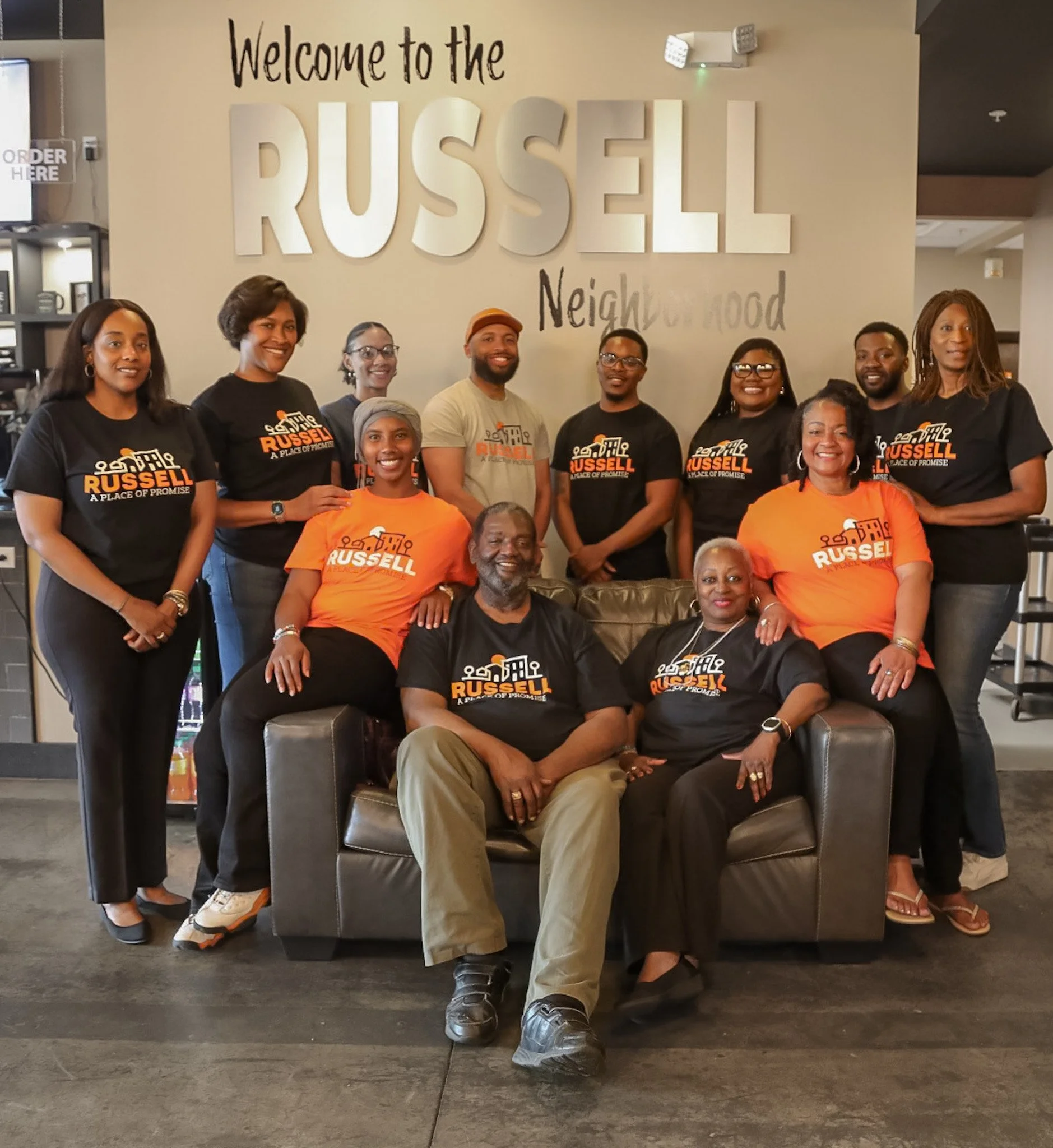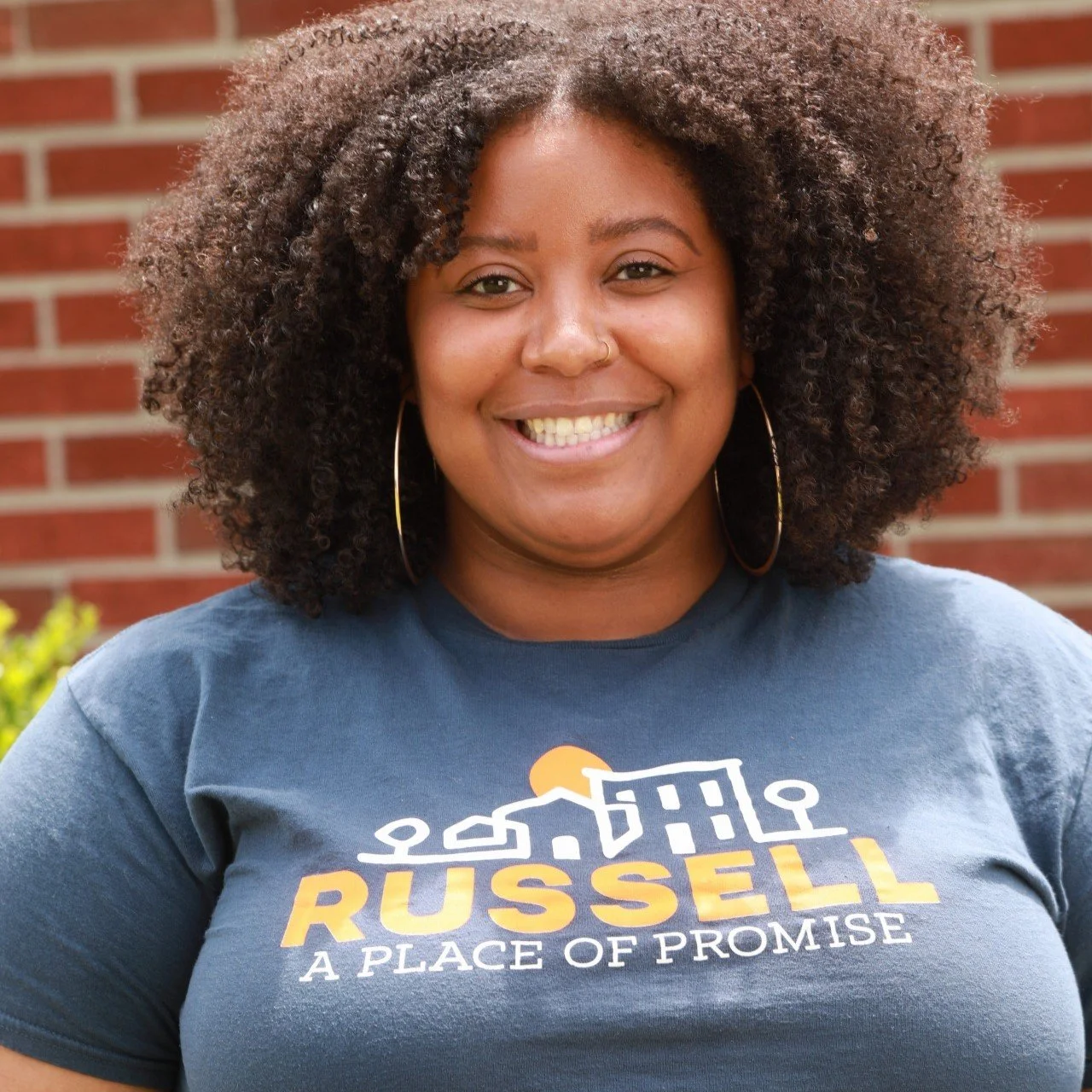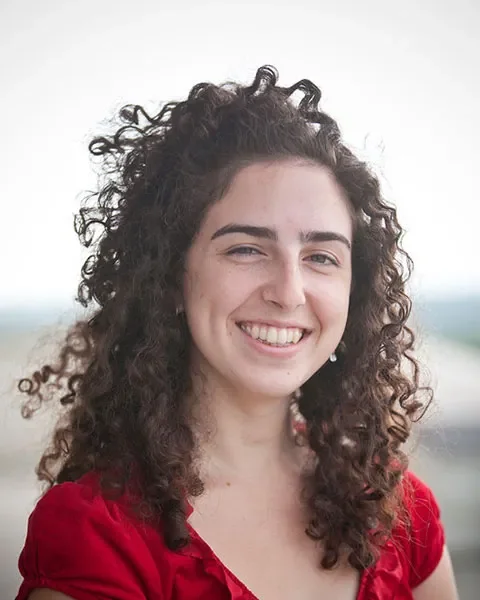
Investing in People & Places:
arts, storytelling, and culture work as the foundation for investment without displacement
by Cassandra Webb, Theresa Zawacki, & Rebecca Hollenbach
Welcome!
Russell is a neighborhood just west of downtown Louisville, a center of Black excellence and the heart of the West End, nine historically Black neighborhoods connected by history, culture, and economics. Russell is home to over 8,000 residents, dozens of businesses, and now a 501(c)(3) nonprofit organization that is a community land trust. We welcome you to the story of Russell: A Place of Promise (RPOP).
Our story is rooted equally in people and place. Russell is unique, but we know from experience that there are many other neighborhoods like it: places of community, culture, and promise where residents are working together to create new futures.
In our story, we’ll share how we embody the work of place and people together, naming four principles that are important to us—resident-led everything, narrative ownership, experiential learning and community building, and capacity and skillbuilding—and how we think funders can shift their practices to authentically support them. And, by doing so, we are therefore also supporting communities and organizations like ours that are working to invest without displacing existing residents, businesses, and community-based organizations that have long been impacted by racist and often violent systems of exclusion and oppression, which have worked to suppress and restrict opportunity for this neighborhood, and others like it.
Russell: A Place of Promise
RPOP began with community. In the mid-2010s, residents, leaders, community-based organizations, and businesses became concerned about the potential impacts of hundreds of millions of dollars in new investment slated for the neighborhood. How could residents be certain this money funded investments for the families who were there, and had been there for generations, rather than causing gentrification and displacement? How could the neighborhood experience a renaissance where changes are paired with intentional and innovative strategies focused on building Black wealth? These conversations gained momentum and support from key community leaders who used their relationships to work with the city on creating an initiative designed to center Black residents and businesses, build wealth and power, and address the negative effects of policies that stripped wealth from Russell and other West End neighborhoods.
RPOP launched in 2018 as a project incubated by Cities United and Louisville Metro Government, with fiscal sponsorship from the Community Foundation of Louisville. Through years of intensive engagement with residents and guidance from this community-led process, in December of 2023, RPOP became legally incorporated as a community land trust (CLT). RPOP has 15 current Board members, of whom 100% are Black, 70% are past participants in RPOP programming; six are Russell residents; and others are Russell business owners or hold strong neighborhood connections.
RPOP’s Promises
RPOP’s promises have always been to people and place, equally. These promises inform how we approach any work we undertake in Russell and within the organization, including shared decision-making: we are resident-led, holistic, asset-based, intentional, and ever-evolving. We believe that culture, arts, and storytelling are inextricable from place-based investments, wealth building, and community development, and so we have woven them into the foundations of our daily work as guides and signifiers of our partnership with and deep respect for the Russell community.
Our Promise of People is rooted in our belief that the people of Russell are assets to their community and to our city. They are whole, creative, and capable of maintaining partnerships that lead to equitable investments in Russell that build increased levels of ownership and multidimensional wealth for Black families. Russell residents have co-created RPOP’s values and approach and serve on our staff and Board; and their opinions, desires, and necessities are reflected in all RPOP’s decisions through a high degree of community outreach and engagement.
Our Promise of Place positions our physical investments as tangible evidence of our connection with and accountability to the people of Russell. We believe investments in Russell must add more value to the community than they extract. As an organization committed to building Black wealth, we must fairly balance risks and rewards among all stakeholders, starting with residents, and give options for multiple types of ownership to guard against displacement.
Based on resident feedback, in mid-2020, 28 Russell residents, aged 22-72, and all of whom were Black, received laptops, tech support, and stipends to engage virtually in the Russell for Russell Resident Coalition. The Coalition created the Russell Partnership Pledge, which lays out values and guidance for how staff, partners, and residents should approach the work of the organization including investment, strategies for wealth building, policy and advocacy, and organizational development and planning. RPOP’s commitment is first and always to operate in ways that align with these shared values:
“[RPOP], the Russell community and partners, agree to move in momentum with residents and their expectations of how people-informed neighborhood development should operate and stay true to the Russell community. We are committed to stabilizing, creating, and growing Black wealth through investment without displacement. We are driven to think critically and consciously with Russell residents at the center.
Our pledge to Russell and one another embodies principles to stabilize, create, and grow Black wealth in the Russell community.”
RPOP’s Promises in Action
In 2022, RPOP partnered with a local nonprofit affordable housing developer to provide free home repairs to nearly 54 Black residents. The program responded to a critical reality: many homeowners in the neighborhood struggle to cover mortgages or taxes, leaving little for essential repairs that ensure safety, health, and accessibility—repairs that allow families to remain in their homes.
Through the program, homeowners received up to $6,000 in repairs, end-of-life planning services in partnership with the Legal Aid Society and a local funeral provider, and the opportunity to document their stories and sit for personal or family portraits. Ten Black artist-storytellers worked alongside 32 Black residents to conduct interviews and gather stories, culminating in mixed-media art and storytelling that celebrate Russell and its residents. This months-long collaboration became the subject of “For the People Next Door,” a group art exhibition that will eventually find a permanent home in the planned 30th and Madison development—five acres of residential and commercial properties in the heart of Russell.
This work was made possible with grant funding from the Humana Foundation, which focused on addressing social isolation and loneliness and advancing housing stability among elder and disabled residents. This ensured that RPOP’s work could center long-term, intergenerational families who have been negatively impacted by policies such as redlining and provide critical support while also creating pathways to build and pass down wealth. Just as importantly, it enabled residents to share their stories on their own terms, reshaping how Russell is seen—both by its residents and by the wider community.
Why Culture and Arts Matter to Community Building
Redlining practices in the early 1900s and urban renewal efforts in the 1950s and 60s decimated Russell’s residential and business community, destroying opportunities for generational wealth building. Since then, a host of seemingly neutral but racially discriminatory institutional and state actions and policy decisions have perpetuated these patterns, keeping families from preserving and building wealth.
These decisions have taken away autonomy, ownership, and opportunities. But this is not the final story. With intentional work, we can help build a future with Russell residents that is truly theirs. We also understand the multiplicity of ways in which these histories of oppression and resource scarcity have materially negatively impacted the possibilities that exist, and we work to build structures that intentionally and directly respond to and change the status quo. We believe in residents having the power to tell their stories, inform their own narratives, to create a neighborhood that they are proud of and support, and that, in return, supports them.
Our arts and storytelling work—directly tied to our place-based investments—reflects that owning the narrative of the place is just as key to wealth building as owning a home or a piece of a new development. Without resident narrative ownership, the neighborhood’s story belongs to someone else. We know from experience that when residents are part of the design and ownership of community assets, it leads to projects that are beloved, valued, protected, and stewarded—and therefore sustainable and meaningful. Grantmakers can help rebalance power by funding resident-led initiatives in place-making, storytelling, and culture.
Principles of Grantmaking for People and Place
Here, we outline core principles that we believe are critically fundamental to investing in people and place together, grounded in our experience, often in partnership with funders. We also provide recommendations for how arts and culture grantmakers —and ALL funders— can advance a more holistic version of community development.
RPOP’s Principle: Resident-led everything
RPOP has centered residents and community from the very beginning, continually evolving through what we’ve learned in hundreds of community engagement events, weekly neighborhood canvassing, and ongoing dialogue. As residents shared their wishes for RPOP to become a CLT, this guided our board development and recruitment to ensure members would be prepared to make meaningful decisions about real estate development, while still maintaining the transparency and community engagement we are known for.
Grantmaker Spotlight:
The William R. Kenan Jr. Charitable Trust
The William R. Kenan Jr. Charitable Trust was a catalytic first funder. The support provided was multi-year, and we enjoyed a close relationship with the Trust’s staff lead who listened to folks on the ground, made connections to similar organizations and experts in the field, and guided the Trust to invest in other projects/programs in and around Louisville that supported Black-led organizations. Trust staff members built community engagement into the funding process and, over multiple site visits, made a point to meet with residents to hear first hand about our progress and their goals for the Trust’s investment. The Trust was not rigid about deadlines nor grant goals, and was willing to work in partnership with RPOP to create impact.
Lessons for Grantmakers: Fund with patience, trust, and longevity
Make unrestricted multi-year grants that take into account the necessary flexibility and openness to change needed to foster truly resident-led processes.
Fund board development activities and support resident involvement through staff roles, stipends, and participation in community events.
Recognize resident expertise as an asset that makes community development sustainable.
Tailor grant applications and agreements to center community engagement processes, recognizing that goals, deliverables, and timelines may shift as residents become more deeply engaged in the funded work.
RPOP’s Principle: Narrative Ownership
RPOP has always been clear that Russell’s racialized history must shape our strategies. This has meant grounding our work in research on the impacts of redlining and health equity in the community, while also amplifying resident experiences and stories about Russell through the Russell Storytelling Project. In 2021, for example, an intern and a Russell resident led a Juneteenth project that highlighted the stories of three Black residents, celebrating their contributions to and lived experiences in the community. Building on the success of this work and the original Russell Storytelling Project, RPOP went on to launch “For the People Next Door.”
Grantmaker Spotlight:
Humana Foundation
“For the People Next Door,” part of the Russell Storytelling Project, was funded by the Humana Foundation. The Foundation recognized the importance of supporting arts, culture, and place together. They also partnered with us to develop metrics that reflected the impact of our work in addressing social isolation and loneliness and housing stability for elder and disabled homeowners—while avoiding intrusive or burdensome surveys for program participants.
Lessons for Grantmakers: Fund culture work as part of development planning
When funding place-based investments, build opportunities for multiple forms of historical research, arts, storytelling, or other culture-focused work to complement those investments.
For arts funders, consider how to braid your funding with other grantmakers who are historically engaged in community development or urban planning work. Funding arts and culture as a part of development planning can be a strategy for narrative preservation and authentic relationships that guide development decisions and build trust.
Support resident capacity to participate in research and oral history projects so that history-making and storytelling can be a permanent part of the community. Find and fund underrepresented voices, especially Black voices, that have been marginalized or erased through racialized policies and programs.
RPOP’s Principle: Experiential learning and community building
Doing people- and place-centered work requires imagination, innovation, creativity, and support. Creatively expressing new ways of working can be cultivated through exposure and experience. There are many examples across the country of organizations and people who are doing this work, and it is important for staff, board members, and engaged residents to have the opportunity to learn from and be inspired by each other. Examples of resident trips have included: Boston, to visit the Dudley Street Neighborhood—the first CLT in the country; Lawrence Community Works, which helped start a neighborhood-focused nonprofit in Louisville; and the Boston Ujima Project, which pairs resident perspective with high-impact lending pools focused on businesses prioritized by the community. Other organizations that inspired the structure and focus of our eventual 501c3 included Africatown Community Land Trust, Tacoma Hilltop Action Coalition, Wana Wari, South Baltimore Community Land Trust, Grove Park Foundation, Sweet Auburn Works, Avondale Community Development Corporation, and MORTAR. The relationships that residents and staff built on these trips have allowed us to continue rich conversations and nimble troubleshooting as we center community power in development.
Grantmaker Spotlight:
The James Graham Brown Foundation
The James Graham Brown Foundation provided an operating grant that included funding for resident travel and shared learning. Residents’ travel experiences helped them understand Louisville’s uniqueness as well as imagine possibilities for Russell.
Lessons for Grantmakers: Support shared learning experiences
Fund professional development and travel opportunities that give residents, board members, and staff opportunities to grow their knowledge.
Support convenings and opportunities for shared learning and practice, both virtually and in-person, for organizations that are doing similar work. Foster opportunities for grantees to share successes and challenges freely, without fear of being penalized or losing future funding.
RPOP’s Principle: Skill and capacity building
Racism is reinforced through limiting access to knowledge, social capital, wealth, political decision-making processes, and power that enable Black communities’ full self-determination and autonomy. RPOP has approached development by centering resident skill- and capacity-building as part of decision-making for place-based projects.. The Russell Futures Learning Lab was a three-month shared learning opportunity through which 14 residents were able to work with students and faculty from the University of Kentucky’s School of Architecture to prioritize the selection of lots for RPOP to acquire for permanently affordable housing, define design guidelines for those future homes, and learn from national technical assistance providers about CLTs as a shared equity model. Participants learned more about the collaborative design process, real estate development basics, and CLTs while also giving students the chance to engage real stakeholders on an actionable project now moving into early implementation.
Lessons for Grantmakers: Be open to how you define successful programs
Fund educational and learning opportunities, including staff positions that support diverse training opportunities, as well as partnerships with existing organizations.
Be open-minded about what constitutes workforce development, including paid opportunities for residents to gain exposure and learn new topics or skills that might otherwise be out of reach.
Be open to what metrics of “success” look like and how they are measured. For example, a measure of success might be for residents to build the skills to lead the organization, which may not exist in a typical validated scale or survey instrument. Thus, it may not look like much is “happening” when in fact an organization is in a growing season, developing resident engagement skills and preparing residents to engage with a program or project.
From Here to There
We know this work can be difficult—especially in a moment when federal policies and national attitudes are targeting programs that acknowledge ongoing disparities based on race, gender identity, immigration status, and more. Building a future where we can all thrive requires flexing underutilized muscles: challenging assumptions and timelines, and sometimes taking risks in funding decisions despite the resistance of those who would prefer not only to maintain the status quo but to return to a time when racism, sexism, ableism, classism, and other oppressions were much more overt. RPOP is rooted in the knowledge that we must move toward the principles outlined above so that communities can directly influence what they want, define their own futures, and push back against systems, policies, and practices that perpetuate disparities. Funder support is needed now more than ever to sustain arts, storytelling, and culture work as the drivers of place-based community development—work that centers resident power and decision-making, reclaims community narratives, and directs investment toward building community wealth.
ABOUT THE AUTHORS
Cassandra Webb (she/her) is a Louisville-based advocate for Black youth, families, and communities, with a national footprint in social justice, equity, and community investment. She serves as the Co-Executive Director of Russell: A Place of Promise, a community land trust focused on building affordable housing and investing in the people and places without displacement in the historically Black Russell neighborhood in Louisville, KY. Her work spans youth leadership development, violence prevention, and policy advocacy.
Rebecca Hollenbach (she/her) is an independent consultant who has spent her career in nonprofits and government trying to move us closer to a reality where everyone can thrive. Her experiences have focused on public health, organizational change and strategy, and policy and advocacy work, all with the lens of racial justice and health equity.
Theresa Zawacki (she/her) is Co-Executive Director and co-founder of Russell: A Place of Promise where she leads fundraising and place-based investments offering power sharing and layered ownership for residents of Russell, a historically Black neighborhood in Louisville, Kentucky. Theresa previously led local food initiatives, targeted neighborhood redevelopment in the Russell neighborhood, community engagement, development projects for Louisville Metro Government. She began her career practicing law in the private and public sectors, where she specialized in land use, planning and zoning, land conservation, and environmental law, and taught planning law at the University of Louisville.
All photos by Marcus Pipes, owner of MAP Visuals, courtesy of Russell: A Place of Promise
ABOUT THE COVER ART
A Solid Alternative by Ivonne Navarro for Fine Acts; updated by Grantmakers in the Arts (2025).
Follow Ivonne Navarro across social media at @ivonnenavarroillustration. The Greats is made with hope and love by Fine Acts.





